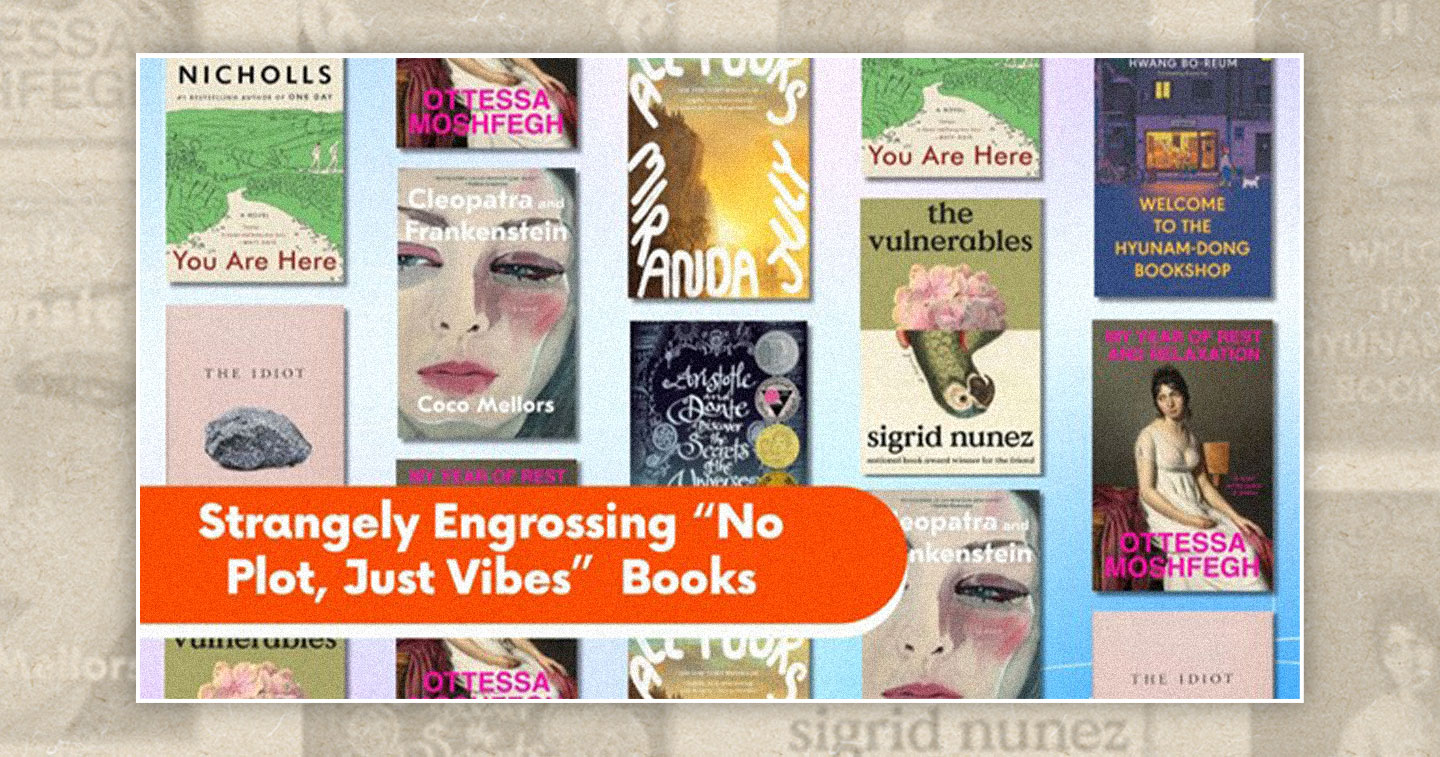MANILA, PHILIPPINES — Have you ever encountered a book where almost “nothing” happens? These books might seem nearly plotless, with little to no action, pivotal events, or external struggles. Yet, somehow, they manage to be completely engrossing, drawing you in page after page, word after word.
The Booktok community has coined a term for these kinds of books — “No plot, just vibes” — books with light or soft plots that rely on the characters to drive the story forward. In “plotless” books, the conflicts are found in the inner turmoil of characters, and as readers, we get an all-access pass to the fluctuations of a character’s innermost thoughts. Another key characteristic of “plotless books” is insightful conversations between characters that are so natural, believable, and relatable that you almost feel like you’re a fly on the wall, witnessing the conversation go down.
These stories are quieter, more introspective, and in many ways, more reflective of real life than those filled with dramatic plot twists. After all, isn’t real life often quieter, less eventful, and, well, not particularly plot-heavy? But don’t be fooled — these books are anything but boring.

Here’s a list to possibly suit your reading mood:
My Year of Rest and Relaxation by Ottessa Moshfegh
Set in 2001, an unnamed narrator, blonde, beautiful, rich, and young, decides to take a year off to sleep to escape her problems. Thanks to a quack psychiatrist and an arsenal of pills, she pretty much succeeds in hibernating for a year.
Though she sleeps a whole lot in this book (most times, losing consciousness and forgetting events that transpired before), we meet important characters in her life, like her best friend Reva, with whom she has a toxic relationship, and her ex-boyfriend, a Wallstreet fund manager who treats her like crap.
This book may have a polarizing effect on readers in general, but those who love it are deeply passionate about it, calling it a “darkly comic, deeply profound” (New York Times) and “funny and weirdly exhilarating novel” (Slate). Even Margaret Atwood is a fan, tweeting that it’s a “caustic, funny, dark addition to the lineage of unlikeable female protagonists by Mona Awad, Sheila Heti, Anita Brookner, Jean Rhys, and Emily Brontë.”
The Idiot by Elif Batuman
If you’ve ever been a college freshman and remember the feeling of being plunged into a strange and bizarrely new environment and were unable to articulate your feelings and thoughts at that time—then you’ll love this book!
The Idiot follows Selin and her perplexing experiences as a naive freshman at Harvard College. She signs up for classes she’s never heard of, such as an obscure-sounding art class called “Constructed Worlds,” befriends a worldly Serbian classmate, Svetlana, and begins a peculiar friendship with a Mathematics student named Ivan, who she corresponds with via email.
Though the plot is minimalist and the romance with Ivan is anything but conventional, Elif’s prose is captivating. The Idiot is rich with stream-of-consciousness vignettes, as Selin grapples with the mundane and the profound. Literary references abound, and Selin’s philosophical musings on language, communication, and identity add depth to the narrative. While not much happens in The Idiot, the novel offers an insightful and often funny exploration of a young woman’s attempt to make sense of her world.
All Fours by Miranda July
In All Fours, the narrator and protagonist is a 45-year-old semi-famous artist, wife, and mother. When an important figure from work requests a face-to-face meeting, she opts for a cross-country road trip from LA to New York instead of flying. But her journey takes an unexpected turn.
Just thirty minutes from home, she locks eyes with a handsome garage attendant in a small town, checks into a nearby motel — and stays there for three weeks. What follows is a passionate, obsessive, yet unconsummated affair with the much younger garage attendant.
Beyond seeking an escape from the monotony of her domestic life and a marriage that has lost its spark, the protagonist embarks on a journey of self-discovery.
While the plot may be minimal — a woman leaves home, goes on a journey, and returns — the real story unfolds within the narrator’s mind, as she dishes out wry observations about marriage, sex, aging, careers in the creative world, women’s bodies, midlife crises, and identity — all delivered with humor, fearlessness, and raw honesty.
You Are Here by David Nicholls
In You Are Here, we meet two people who are lost and lonely: Marnie (divorced and stuck in limbo) and Michael (recently separated and turned reclusive). Michael is a grumpy geography teacher who takes long, solitary walks to avoid his empty house. Marnie, a copy editor, is agoraphobic and has started to find satisfaction in JOMO (joy of missing out).
Their lives collide when a mutual friend, Cleo, invites Marnie along to join part of Michael’s epic ten-day hike in the English countryside. Enter British-style banter, complemented by unpredictable weather, rock formations, bed and breakfasts, drunken escapades, and lots of fish and chips.
Congruous to the characteristic of “no plot, all vibes books,” You Are Here doesn’t contain sparks, or jolting events; nothing extreme, nothing exceptional, nothing big. But what it does have is lots of heart as Nicholls succeeds in making readers care deeply for the characters, their backstories gently woven in alternating chapters.
The title itself is apt and very symbolic, pertaining not only to the pinned location in a walk but also to where the characters are emotionally.
Cleopatra and Frankenstein by Coco Mellors
You may have seen this book plastered all over Instagram, the Booktok sensation slash sleeper hit Cleopatra and Frankenstein, and rightly so, This book is hard to pin down, embodying the essence of the “No plot, just vibes” subgenre. But stick with me.
The story begins with a classic meet-cute: Cleo, a British artist in her 20s, and Frank, a successful ad agency owner in his 40s, meet in an elevator as they both try to escape a party on the cusp of the new year. Sparks fly immediately, and within six months, they’re married.
What follows is far from your typical rom-com; Cleo and Frank navigate the messiness and complexity of their relationship. The novel also offers glimpses into how their impulsive marriage impacts the lives of those closest to them in ways no one could have predicted.
Set in New York, Cleopatra and Frankenstein is a big-city romance that introduces us to very real human characters facing relatable struggles, masterfully melding the mundane with the tragically beautiful.
The Vulnerables by Sigrid Nunez
Let go back to 2020, when the global COVID-19 pandemic began. Remember the lockdowns, the cabin fever of never leaving the house, and suddenly having the time to make sourdough and care for plants?
If you haven’t processed the pandemic yet and enjoy minimally plotted books, then this is the book among the list to pick up.
Set in 2020, an unnamed narrator, a middle-aged writer deemed at risk during the pandemic (hence the name “vulnerable”), struggles with writer’s block in a large fancy apartment in New York. Her roommates are not exactly, you would say, typical: a spirited parrot named Eureka and an adrift Gen Z called Vetch, who was the former caretaker of the apartment.
Most of the story takes place in the apartment. It’s not so much about what’s happening in the outside world as it is inside the narrator’s head.
In a First Look Club’s book review, writer Erin Sajonas refers to this book as “technically not a novel, I don’t think it would be far off for me to describe this work as more of a collection of reflections, anecdotes, and intelligent ramblings.”
Welcome to the Hyunam-dong Bookshop by Hwang Bo-reum
Yeongju did everything society expected of her: she went to university, married a respectable man, and secured a stable job. But when it all fell apart, she decided to leave her old life behind and pursue her dream of opening a bookshop.
What unfolds is a light, minimally-plotted story where Yeongju navigates the challenges of running a small business. Along the way, we meet a cast of intriguing characters: Minjun, a barista who has strayed from the conventional path; an unhappily married coffee roaster; a writer who sees something unique in Yeongju; and various customers who find solace in her bookshop.
The book doesn’t follow the typical structure of novels (inciting incident points, crisis, climax, resolution). Instead, it feels like a series of short stories woven together, all taking place in Yeongju’s bookstore-café. Gradually and subtly, we witness the characters begin to heal and reclaim their lives on their terms.
A “no plot, just vibes” book, as well as a cozy read, Welcome to the Hyunam-dong Bookshop sends a powerful message to readers — that it’s okay to be different and not to follow the same path as everyone else.
Aristotle and Dante by Alire Saenz
In the award-winning Aristotle and Dante, Saenz introduces us to two young characters who couldn’t be more different. Aristotle or “Ari” Mendez is an angsty Vietnamese teen whose brother is in prison. Dante Quintana, on the other hand, is an expressive, sensitive soul, unafraid to show his emotions—the last person you’d expect to break through Ari’s tough exterior.
But he does, one summer at the swimming pool, where Dante teaches Ari how to swim. From that moment on, we follow Ari and Dante as they navigate the ups and downs of growing up—through horrific accidents, tragic losses, painful lessons, and funny episodes. Their friendship blossoms into something deeper, and their bond becomes one for the books. (Prepare your tissues; this is a vibey novel—the sad, ugly, crying kind of vibes.)
“No plot, all vibes books” by its nature of being introspective and presenting real-life characters with all their quirks and warts and all, has the power to connect to readers in a deeper way.
This is not to say that “heavily plotted” books have lost their place on our shelves; the “no plot, all vibes” books have arrived and are happily here to stay. For us readers, this means we have more styles, stories, and authors to discover, making us wonder — which strangely engrossing plotless book will we pick up next?
For more bookish news and recommendations, click here.








